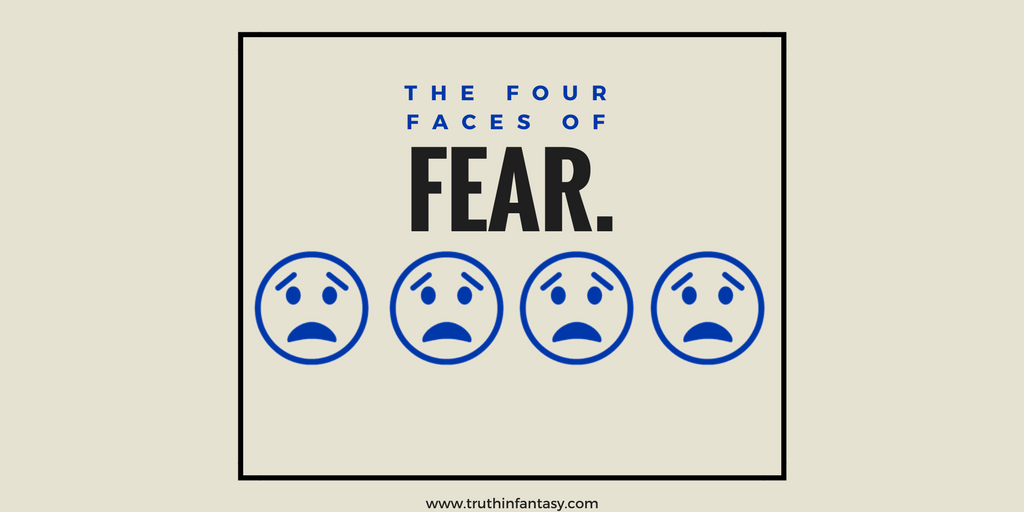've decided to savor my “to be read” list, so I'm saving the cream of the crop for my next vacation— if I can wait that long. The excitement is just about killing me. I’ve got two offerings by Thea Harrison, a new Iron Druid novel, and, of course, Karen Marie Moning’s newest book, Feverborn, which I’m positively salivating to read. To keep the hunger pains at bay for now, I’m rereading Burned, which I've only read once (unlike the first five Fever books, which I've read at least five times each). As you know, I live in abject fear that I will run out of great paranormal urban fantasy books, leaving me bereft and desperate. I'm sure there's a name for this, like aneobibliophobia—fear of no new books. What do you think? Can we start a meme? Anyway, my fear that I will run out of amazing stories in which to immerse myself got me to thinking about fear generally.
As I've written about several times, it was Ms. Moning who taught me that hope strengthens, fear kills. True enough. But what is it about fear that makes it so commanding? In the beginning of Burned, we read about the Unseelie King, an entity so powerful, so vast, that nothing threatens him. He knows no fear until he loves. At that point, he becomes vulnerable, as we all do. Then the king knows true fear: the fear of losing something he loves more than anything.
The fear of losing something we have is one of the four faces of fear. It is the counterpart to being afraid that we won't get what we want in the first place. These fears, in turn, go hand in hand with our fear of not being enough, and the terror that there won't be enough—of anything—to go around; the fear that we won’t get our share. The first two aspects of fear are specific— we know what we want and we are scared we won't get it or we’re scared we'll lose it. The second set of fears is more existential and diffuse. Together they can leave us running for our lives, belligerently fighting against fate, friends and enemies alike, or paralyzed with dread. Fear leads us to flight, fight or freeze. It never leads to anything good.
There was a time when my whole existence was mired in fear. I felt like a puppet whose strings were being controlled by my extreme reactivity to all that frightened me, which was pretty much everything. I was afraid of people and also of being abandoned and left alone. I was afraid of nature and scared in the city. I was afraid of failing and I was afraid of succeeding. I was afraid of being seen, and afraid of being invisible. I was afraid of being used, and afraid of being ignored. I was miserable, mired in the suffocating web of my paranoia.
But fear is a funny thing. Turns out we can overdose on the stuff and become desensitized to it. If we are in a constant state of panic, eventually the panic recedes to the point where we can become sufficiently sentient to realize we have neither died from what we feared nor has the fear itself killed us. At least not yet. It's why I'm generally only terrified in the beginning of a plane ride. The takeoff finds me gripping the armrests, or, on occasion, my traveling companion, whether I know them or not. By the time we level out at 35,000 feet, my panic is easing, and when the flight attendants are coming around to take drink orders, I'm getting bored.
Maintaining a specific fear is generally unsustainable. We can rally for a new source of terror, but consistently being fearful about the same thing gets old. For example, when our twins were babies, I used to check their breathing incessantly while they slept—to make sure they were alive. My husband was actually very happy about that, because it meant that I had stopped checking his breathing incessantly while he slept (which invariably led to his not being able to stay asleep). But the constant checking got old, and my fears about something happening to my family while they slept peacefully in our home slowly abated.
Fear is no fun. Fear causes us to live in the wreckage of our future where the fearful event will take place (where we lose what we currently have, or never get what we currently want and don't have). Fear is always about what will happen later, because we can't be afraid about the present moment--either we have what we want in that moment or we don't. We don't need to be afraid about it; we can be sad or mad or happy about an existing situation, but we can't be afraid about this exact moment, only what will happen in the next one.
So, while hope can strengthen and fear can kill – it’s not always like that. Fear reminds us of what we value, that which we do not want to lose, and also of our strength – flights and nights that we lived through – and how to prioritize our time. If we keep fear in its place, we can use it to go after what we want, work to keep and protect it, and not take it for granted once we get it. Many, although not all of my fears are shadows of their former selves, thankfully. I’ve learned to live with most of them, and I’m at the stage where I’m being asked, “Coffee or tea?” by a friendly flight attendant. So, I will say, “Thank you, Ms. Moning, now please get back to the keyboard… my aneobibliophobia is acting up.”

